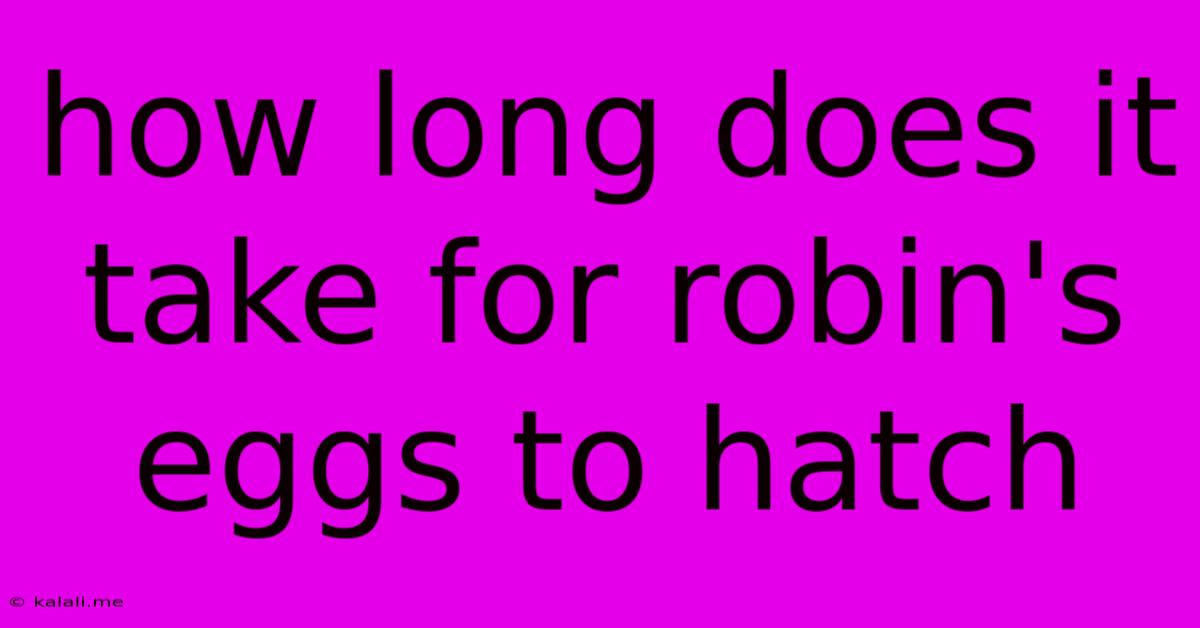How Long Does It Take For Robin's Eggs To Hatch
Kalali
Jun 07, 2025 · 3 min read

Table of Contents
How Long Does it Take for Robin's Eggs to Hatch? A Comprehensive Guide
Meta Description: Curious about the incubation period of robin eggs? Learn the average hatching time, factors influencing it, and what to expect during this exciting process. This guide covers everything from egg laying to fledgling flight.
Robins are beloved backyard birds, and their nests often provide hours of fascinating observation. One of the most intriguing aspects of robin nesting is the waiting game – how long does it take for those beautiful blue eggs to hatch? The answer isn't a simple number, but rather a range influenced by several factors. This comprehensive guide will delve into the incubation period, providing you with the knowledge to better understand and appreciate these remarkable creatures.
The Average Incubation Period
On average, robin eggs take around 12 to 14 days to hatch. This period begins from the time the last egg is laid, not from the laying of the first egg. This is because female robins typically don't begin consistently incubating until the clutch is complete. So, while you might see her sitting on the eggs earlier, the true countdown begins once all the eggs are in the nest.
Factors Affecting Hatching Time
Several environmental and biological factors can slightly influence the incubation period:
- Temperature: Warmer temperatures can slightly speed up the hatching process, while cooler temperatures can prolong it. Extreme temperatures, however, can be detrimental to the developing embryos.
- Species: While we're focusing on American Robins ( Turdus migratorius), slight variations might exist within different robin subspecies.
- Egg Size and Fertility: Larger eggs or those with stronger fertility might hatch slightly faster.
- Parental Care: Consistent incubation by the parents is crucial. Disturbances or interruptions to incubation could potentially delay hatching.
What to Expect During Incubation
During the incubation period, you might observe the following:
- Consistent Incubation: The female robin will spend most of her time sitting on the eggs, keeping them warm. The male robin will also assist with incubation, especially when the female needs to forage for food.
- Egg Turning: The parent birds regularly turn the eggs to ensure even heat distribution and prevent the yolk from sticking to the shell.
- Pipping: A few days before hatching, you might notice tiny cracks appearing on the eggshells – this is called "pipping." This is a sign that the chicks are working their way out.
- Hatching: The hatching process itself can take several hours. The chicks will use their egg tooth (a small, temporary projection on their beak) to help break through the shell.
Post-Hatching Development
After hatching, the chicks are altricial – meaning they are born helpless and require significant parental care. They remain in the nest for approximately 14-17 days before fledging (leaving the nest). During this time, the parents diligently feed and protect them.
Conclusion
Understanding the incubation period of robin eggs adds another layer of appreciation for these common backyard birds. While the average time is around 12-14 days, various factors can cause minor variations. Observing the nesting process, from egg-laying to fledgling, is a rewarding experience that highlights the remarkable lifecycle of these fascinating creatures. Remember to observe from a distance to avoid disturbing the nesting process and ensure the safety of the birds and their young.
Latest Posts
Latest Posts
-
Best Way To Attach Piers For Deck
Jun 07, 2025
-
How To Adjust Pressure Reducing Valve
Jun 07, 2025
-
What Can I Use As A Lubricant For Bike Chain
Jun 07, 2025
-
Party In The Front Business In The Back
Jun 07, 2025
-
Do Plumbing Vents Have To Go Through The Roof
Jun 07, 2025
Related Post
Thank you for visiting our website which covers about How Long Does It Take For Robin's Eggs To Hatch . We hope the information provided has been useful to you. Feel free to contact us if you have any questions or need further assistance. See you next time and don't miss to bookmark.